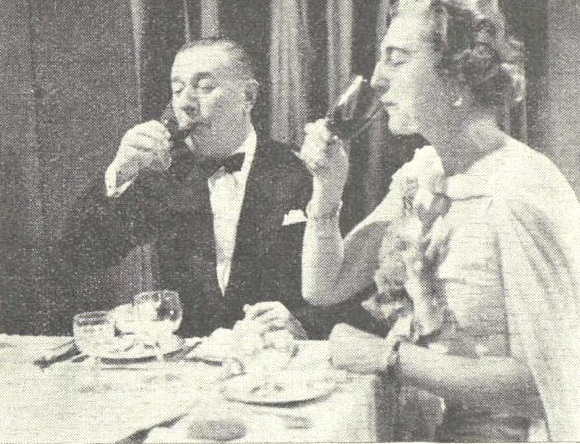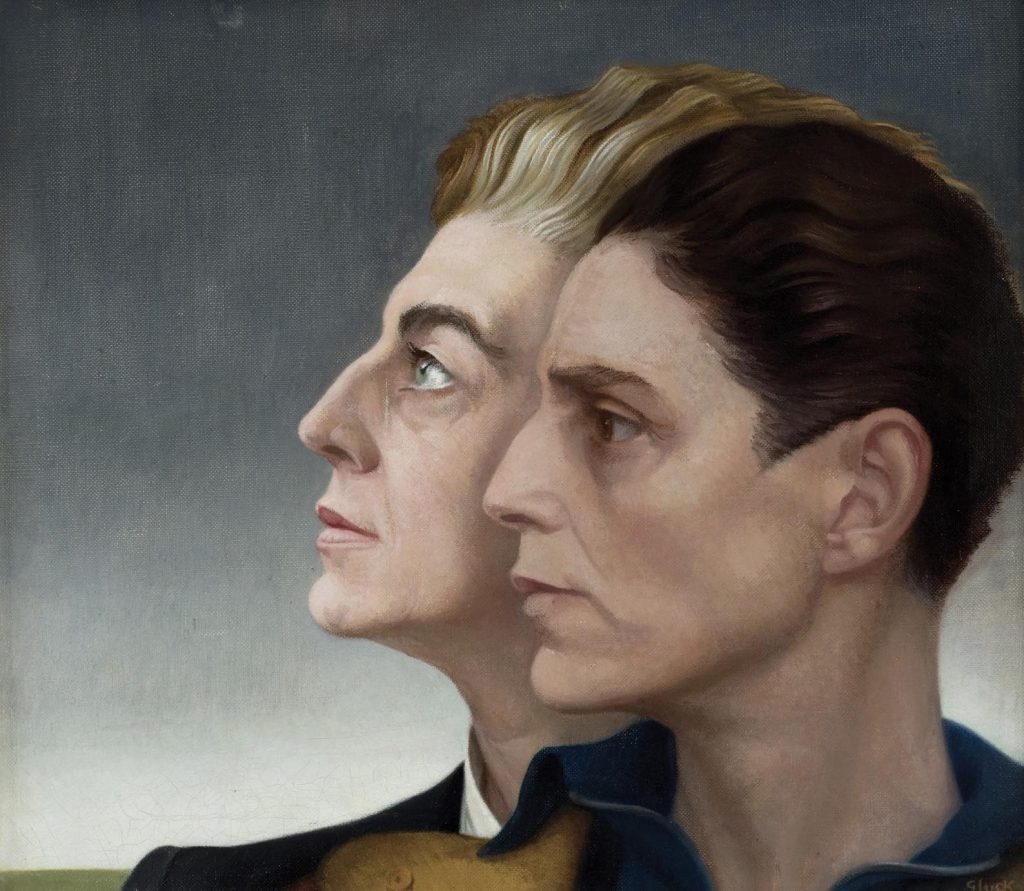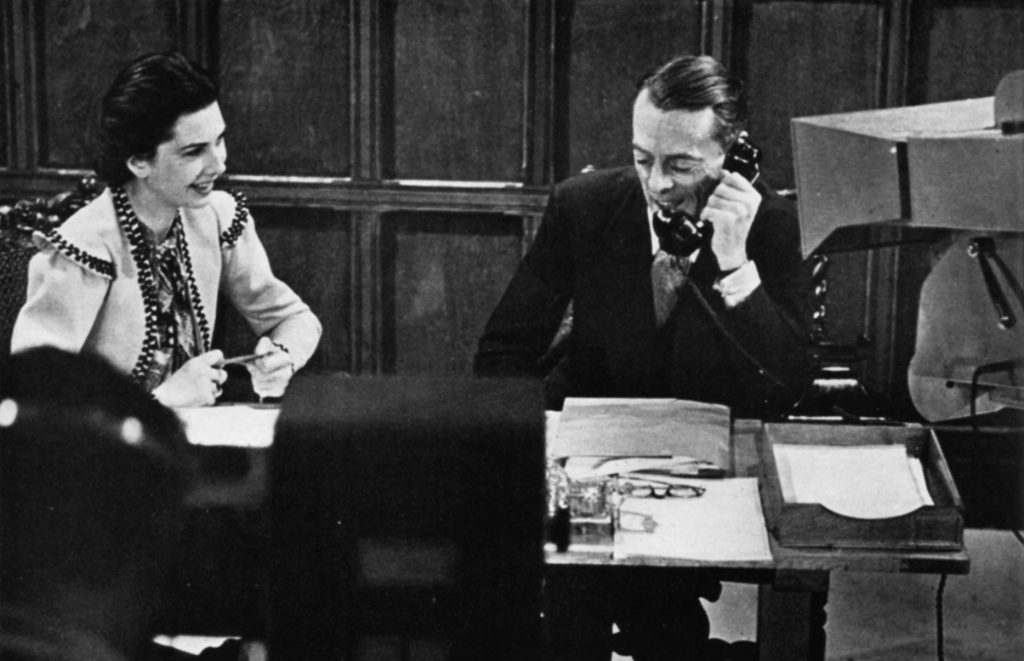OTD in early British television: 23 December 1938

John Wyver writes: spoiled for the eve of Christmas Eve choice today, I think we might attempt a double-header, celebrating Polite Wine Drinking (above) on this day in 1937, and then The Director of Television in the Witness Box, shown on Friday 23 December 1938. The former was a component of Alexandra Palace’s aspirational lifestyle propgramming that also featured bridge, ballroom dancing and tennis lessons. The format was simplicity itself: sat at a dinner table chef Marcel Boulestin mansplained wine in an off-the-cuff manner to Nesta Sawyer.
Boulestin is an interesting figure. By December 1937 he was a familiar face for television viewers, with his monthly demonstrations of how to prepare a dish such as partridge smitane (‘partly roasted with a sour cream sauce’) or moules marinière. Having established himself as a purveyor of upmarket interior decoration in London before the war, he abandoned this profession and opened a celebrated Covent Garden restaurant in 1927.
His writing and speaking were distinguished by a light, conversational tone which complemented his somewhat casual approach to questions of quantities and cooking times. Moreover, despite the fancy appellations, as Thomas Marks wrote in a 2023 issue of Apollo, his ‘recipes and menus… were not so much aspirational as achievable.’
Nesta Sawyer, also known by her married name of Nesta Obermer, is perhaps even more interesting. A regular guest in various guises on pre-war television, she was a former war correspondent, the wife of the wealthy American playwright Seymour Obermer, a dramatist herself, an international socialite, a philanthropist, and between 1932 and 1944 the lover and muse of the painter Gluck.
The artist’s 1936 joint self-portrait with Obermer, ‘Medallion (youwe)’, is, as Wikipedia says, ‘viewed as an iconic lesbian statement.’ And there’s more about their relationship here in a 2017 article by Diana Souhami.

Polite Wine Drinking was reviewed for The Listener by Peter Purbeck (29 December 1937), who through this year and into 1938 alternated weekly columns with Grace Wyndham Goldie. Purbeck is less concerned than Wyndham Goldie with aesthetics and ontology, but his strength lies in the detailed description of broadcasts that, inevitably, are lost to us. Of this bibulous broadcast, he wrote:
with all his light-heartedness M. Boulestin’s talk was not without its serious interest to those who wished to improve their table manners so far as wine drinking is concerned. He may have pulled gently the legs of those to whom wine-taking is a passionate ritual with his demonstration of the correct grimaces to be indulged in on given occasions.
And he may have scored a point off the snobs of glass and decanter with his neat little list of adjectives which may be used of almost any wine by the novice – soft, generous. rich, pretty, full-bodied and the like; his argument being that if we hit the right word we shall be credited with taste and perception : and if we are wrong, someone is sure to contradict us and we shall be admired for starting such a distinguished conversation. But beneath all this fun was plenty of sound instruction.
The Director of Television in the Witness Box

In the BBC Handbook 1940, Television’s press officer Ernest C. Thomson looked back at the last year of television before closedown and recalled this broadcast:
An intimate link between the station and its public was forged in Christmas week 1938, when Gerald Cock, the Director of Television, went into the ‘witness box’. Facing a television camera at the end of the evening programme on 23 December, Mr. Cock invited viewers to ring him up on the telephone and put questions to him about the service.
Enquirers were asked to have their ’phones in the same room as the television receiver so that, on being ‘put through’, they could see the Television Director lift his telephone and look directly at them as he answered their question. The experiment was almost too successful, for the Alexandra Palace switchboard was jammed and there were many requests for a whole series of the same kind.
The softball questions that made it to air indicate how rigorous was the selection process: ‘When are viewers going to get more than three hours a day of television?’ ‘Can more big fights be televised?’ ‘Would it help to have a special licence for television?’ Also, Mrs Lee, who lived on the Mile End Road, offered ‘complimentary remarks’.
According to The Times:
Replying to one viewer’s question on the subject of the televising of films Mr Cock said: ‘There is considerable opposition to us in films. They are afraid of us-heaven knows why. With exceptions, th exceptions, they won’t let us have anythjng-shorts. or anything else!’ Mr Cock added that long feature films were never likely to make good television. You need to go to the theatre for them. Television does not do them justice.
The indefatigible radio correspondent of the Daily Telegraph had one of the paper’s operators dial every few seconds for the duration of the programme’s 40 minutes but had no luck getting through to Tudor 6420. Watching the screen, they were frustrated that
Mr Cock tended to answer questions at length, apparently unaware of the clamouring thousands while he leisurely removed the receiver.
The Times again:
A B.B.C. official, commenting on the success of the experiment to a reporter, said that, although they had expected only five or six calls, they had had an “avalanche.” The most distant was from Birmingham, 106 miles away.
It was the first time, so far as they were aware, that a responsible authority in broadcasting had been in direct and intimarte touch with listeners and viewers. The addition of vision emphasized the friendliness of the whole transmission.
‘Medallion (youwe)’ so iconic a lesbian image that it was the cover of my eighties Virago Classic edition of ‘The Well Of Loneliness’! I never thought where it came from before.
‘The Director of Television in the Witness Box’ was still identifiably being served up as a BBC Television midwinter treat fifty years later… https://genome.ch.bbc.co.uk/e335caf8de5048e5a6adfb3ce2363fe0